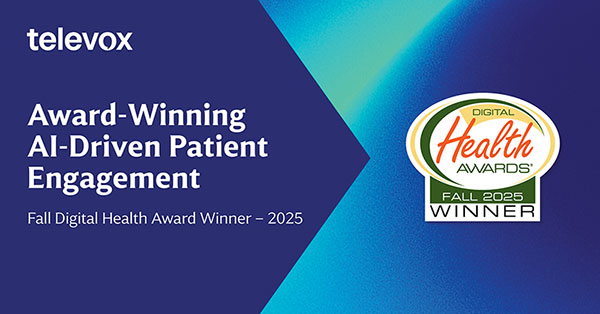Televox is proud to announce that its Enterprise Edition SMS solution has been awarded Gold…

Automated SMS Patient Engagement: Healthcare’s New GPS
Following a rebound from halted in-person care, screenings and elective surgeries due to the pandemic, 2022 is likely to be another year for “healthcare catch-up” as patients continue their return to the healthcare system for routine and preventive care, and even more serious clinical needs. Chronically ill individuals managing multiple doctors, diagnoses and treatments will be especially overwhelmed by their medical to-dos, but all patients occasionally need assistance in navigating the complexity of the healthcare system. Whether it’s because of missed appointments or a lack of adherence around pre-procedure prep, healthcare quality suffers when patients can’t successfully access and manage care.
The challenge is that health system staff members are also more taxed and stressed than ever—meaning that technology—specifically in the form of automated SMS patient engagement—must play a key role in addressing this unmet need for patient support. This approach can help patients successfully navigate the “landscape” of healthcare, in the same way we increasingly rely on GPS to guide us through any complex or unfamiliar environment.
Patients Still Experience Confusion with Care. Patient Engagement Can Help.
Why do these barriers to quality and access remain despite our industry’s best efforts to improve care navigation? One key issue is that varying levels of health literacy continue to affect the degree to which individuals can seek, understand and use information to receive or make decisions about their care. As a result, communications related to test referrals, discharge guidelines after a surgery, or preparation instructions for routine procedures like colonoscopies can be difficult for patients to understand or follow. According to one study, inadequate preparation still occurs in up to 30% of colonoscopies which results in canceled procedures, lost revenue, and additional burden on clinicians and scheduling teams.
This coincides with a prominent issue of overwhelmed healthcare staff who may spend valuable hours trying to reach people by phone, only to leave multiple voicemails or play “phone tag” with patients, further contributing to burnout and delayed care. But perhaps more importantly, people actually prefer to be contacted by text message—75% of millennials and members of Gen Z attested to just this, and one study found that SMS, or text-based, reminders actually improve patient compliance with care and appointments.
Automating SMS, Email and Phone is Key
As health systems consider their longer-term priorities now that people are re-engaging with care via virtual and physical sites, many organizations are turning to automated, SMS patient engagement solutions to seamlessly connect with patients. These tools, especially those that offer two-way communications and chatbot technology, can improve care access and assist patients as they navigate their healthcare journeys. Rather than relying on one-way appointment reminders or manual phone calls to manage treatment compliance, reschedule procedures or deliver preparation instructions, it makes sense to connect with patients through a channel they prefer while allowing them to respond to requests or ask questions when needed.
An automated SMS patient engagement approach can do just that, helping patients by alleviating some of the difficulty and uncertainty of navigating care, getting them back into the healthcare system and back on track with healthy practices. Consider the following engagement platform capabilities that create a better patient experience driven by right-time, actionable, targeted support:
Personalized outreach that’s tailored to patient preferences.
Through deep integration with leading electronic health records (EHRs), the most powerful engagement platforms can honor preferred languages and contact methods (such as text messages or email versus manual phone calls), so you can reach patients at a healthcare decision point, and how they want to be contacted. Chatbots can also mimic natural human dialogue to provide greater support and guidance.
Two-way, real-time, closed-loop messaging.
By allowing patients to respond to your outreach, they can seamlessly confirm, cancel or reschedule through an SMS message, which is recorded in the EHR, eliminating the need for manual appointment management.
Timely communication to encourage patient action.
Regular outreach at the right time goes far beyond a 1-way appointment reminder. Modern engagement platforms can enable patients to connect with a referred specialist, cancel, confirm or reschedule appointments, all through SMS.
Helping Patients Re-Engage in their Health Journey
Whether telehealth has become the preferred venue for patients, or patients are returning to elective surgeries, it’s important to note that people might feel overwhelmed with the healthcare system after having potentially delayed tests, treatments or provider visits during the pandemic. With this in mind, it makes sense to consider a higher-touch engagement outreach that supports these individuals along their care journey. Health systems can do just that, and improve the patient experience with actionable, SMS communications that go far above beyond the one-way appointment reminder. Plus, healthcare operational leaders can rest easy knowing that this automated approach relieves significant burden on staff members and lowers costs by minimizing the time spent on manual outreach, all while increasing revenue by mitigating no-shows and encouraging patients to get back on track with their care.
Our latest white paper for HIMSS details a whole host of best practices for employing automated, SMS patient engagement. You can read it here.
And if your organization is interested in enhancing the way you connect with patients to ease their journey as they navigate through the healthcare system, reach out to us today to learn more about solutions through HouseCalls Pro.



